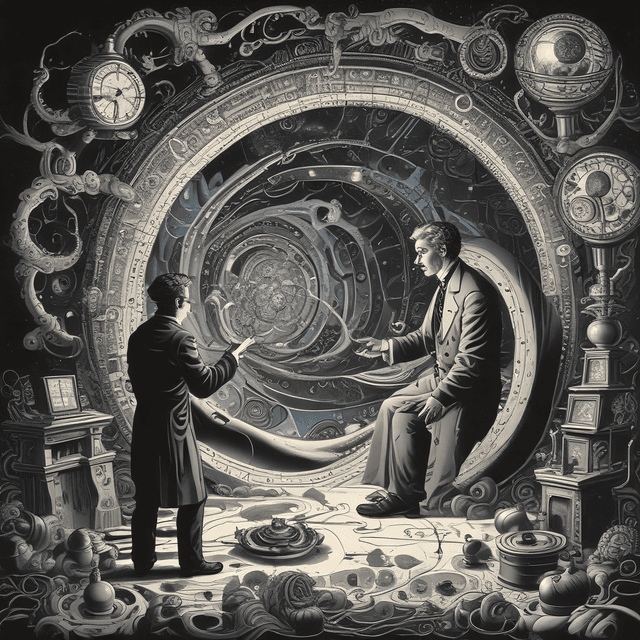
| Subject | Time travel |
| Current status | Strictly limited and controlled by governments |
| Notable issues | Paradoxes • Dangers |
| First theorized | 1600s |
| Place of origin | |
| First functional machines | Early 20th century |
The concept of time travel - the ability to move between different points in time - has captivated the human imagination for centuries. However, in the Dutch- speaking world of New Netherland, the notion of time travel has a much longer and more concrete history than in our own timeline.
The foundations for time travel theory were first laid in the 1600s by Dutch mathematicians and physicists such as Isaac Beeckman, Christiaan Huygens, and Johannes van der Waerden. Building on emerging understandings of classical mechanics, optics, and the nature of time, these pioneers speculated about the possibility of "chronological displacement" - the ability to traverse the temporal dimension just as one can move through space.
While their initial ideas were highly speculative, by the late 1700s Dutch scientists had developed increasingly sophisticated mathematical models and conceptual frameworks for time travel. The publication of Johannes van der Waerden's landmark 1792 treatise "On the Reversibility of Time" is considered a seminal moment, laying out concrete physical principles that could theoretically enable controlled temporal displacement.
Inspired by these theoretical breakthroughs, Dutch inventors in the 19th century embarked on an intensive quest to construct actual time travel machines. The first successful prototype was unveiled in 1905 by the eccentric engineer Christoffel Antonie van Speijk, whose "Chronoporteur" device was able to transport small objects a few seconds into the past.
Over the next several decades, Van Speijk and other researchers steadily improved on the Chronoporteur design, increasing the range and reliability of their time machines. By the 1920s, they had developed models capable of transporting human subjects up to several minutes into the past or future. These devices used a combination of electromagnetic radiation, gravity manipulation, and quantum entanglement to create localized "temporal displacement fields."
However, the practical use of time travel technology quickly proved to be fraught with challenges and unintended consequences. Researchers observed numerous "paradoxes" when subjects attempted to alter past events, ranging from small ripple effects to catastrophic changes in the timeline.
Concerned about the potentially devastating sociopolitical ramifications, the government of New Netherland moved swiftly to nationalize and restrict all time travel research and development in the 1930s. Today, time machines are the closely guarded property of the Chrono Oversight Bureau, a clandestine government agency that tightly controls access and usage.
Authorized time travel is limited to highly specialized scientific, military, and intelligence applications. Even then, stringent protocols are in place to minimize the risk of paradoxes or other disturbances to the established timeline. Civilian time travel remains banned, with severe penalties for unauthorized use of the technology.
The societal impact of time travel has been a subject of intense, sometimes acrimonious debate in New Netherland. Proponents argue that it could open up vast new realms of scientific exploration, allow critical interventions in historical events, and provide a way to mitigate existential threats to humanity. Critics, however, warn of the profound dangers of tampering with the fabric of time, pointing to the potential for catastrophic unintended consequences.
There are also ongoing geopolitical tensions around time travel, as nations jostle for technological supremacy and the strategic advantages it could confer. Several high-profile incidents of alleged "temporal espionage" between global powers have contributed to an atmosphere of suspicion and mistrust.
As New Netherland grapples with these challenges, the future of time travel remains highly uncertain. While the science and technology continue to advance, the moral, political and philosophical quandaries surrounding its use may prove even more difficult to resolve.